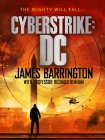Cyberstrike, James Barrington [short story to read .TXT] 📗

- Author: James Barrington
Book online «Cyberstrike, James Barrington [short story to read .TXT] 📗». Author James Barrington
‘Until,’ Morgan prompted.
‘Exactly. Until the people at EDF noticed one apparently legitimate user on their system who was behaving oddly while the attack was still going on. They knew his identity from his log-in details, obviously, but he wasn’t doing what they would have expected, which was accessing the modules that his job required him to use. Instead, he was cruising around the system, looking at completely unrelated material, and at one point it seemed as if he was trying to get access to the encrypted password files and other low-level stuff.’
‘Presumably they kicked him off? And checked that he wasn’t a legitimate user just being a bit too curious?’
‘Yes, and then they started an internal investigation, which didn’t help. They realised only an idiot would use his own log-in credentials to snoop around the system like that, but they checked anyway and ruled him out, for one unarguable reason.’
‘Which was?’
‘He was in hospital. He’d contracted Covid-19 and was in intensive care with barrier nursing and no access even to his mobile phone, far less to a computer, when the intrusion occurred. Whoever it was, it wasn’t him. The EDF security people were cagey about how far the intruder had got, and said no damage was done. No ransomware installed, no data stolen or website pages defaced, nothing like that.’
Morgan shook his head.
‘Hackers don’t normally breach a system just to show that they can,’ he said, ‘and it worries me if this one apparently did nothing apart from take a look around. He might have been trying to install a backdoor so he could access the system in the future, or maybe he was just copying the log-in details of other users. The best place to find a system vulnerability is when you’re inside it, so perhaps that was what he was after. It’s an obvious concern.’
‘I agree with you, so get yourself over to see these security bods at EDF and find out exactly what happened and what they’ve done about it.’
‘Will do. What I don’t quite follow is why you also talked to a couple of politicians about this.’
‘Only because I couldn’t get in to see the Home Secretary or the Foreign Secretary. They were tied up in meetings, so I had to make do with a couple of their minions. And they’re both involved, along with the PM, because of the foreign ownership of these two companies and the possible impact a hacking attack could have on the parts of the UK served by EDF and Npower. I asked the idiot MP who’d been telling me about zombie servers how comfortable his home would be if the mains electricity and gas went offline for a couple of weeks with no backup power supplies available and he actually went white. Best part of my day, that was.
‘Anyway, C-TAC is in the loop now, so off you go and check it out, just in case there’s more to this than meets the eye.’
Chapter 11
North of Lambeth Bridge, London
As Carter steered the launch on an intercept course with the cabin cruiser and continued to close the distance between the two vessels he saw a second man appear in the stern of the boat. He couldn’t tell if he’d just stepped out of the saloon or if he’d been sitting down at the stern of the boat and out of sight.
‘There are at least two of them on board, Bob,’ he said, ‘so don’t forget to take a spare pair of cuffs.’
The attention of all three men in the Targa patrol boat was focused on the cabin cruiser, but it was Crichton who saw the threat first.
‘Is that a boat hook?’ he murmured, almost to himself. Then he recognised the object for what it was and immediately shouted out a warning. ‘Rifle! He’s got a rifle.’
Carter slammed the throttles forward and at the same moment turned the wheel hard to port, trying to drive the patrol boat clear of the sudden and completely unexpected danger.
In fact, Mark Crichton was wrong. Or at least not entirely right.
The word ‘rifle’ in the minds of most people, certainly members of the almost entirely unarmed population of the United Kingdom, conjures up an image of a bolt action weapon, probably in .22 or another fairly small calibre, the kind of thing a farmer would have to hand to take care of rats and rabbits and other small animals. But place the word ‘assault’ before the word ‘rifle’ and the image instantly changes.
What Crichton had seen was the long barrel of a weapon in the hands of the second man on the boat they were pursuing, but at a distance and from a bouncing and unstable platform. If they’d been a little closer, he might have seen the distinctive gas cylinder mounted above the barrel which, along with the forward-curved magazine, are the two most obvious identification features of the Kalashnikov AK-47 and its variants.
But even though Crichton hadn’t immediately realised the exact type of weapon they were facing, it became blindingly obvious in the next few seconds as Carter took evasive action.
As the Targa heeled over, the three police officers heard the yammering sound as the unidentified man on the cabin cruiser fired the assault rifle towards them, the slamming noise echoing off the buildings and river walls on both sides of them.
Carter reckoned they were about a hundred yards away from the gunman, well within the lethal range of the assault rifle, which he guessed was a Kalashnikov because it was the obvious weapon of choice for terrorists around the world. He didn’t know exactly how many shots had been fired in that first burst, but he thought





Comments (0)